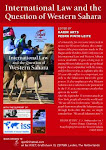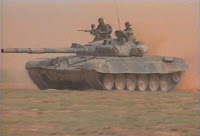
Security Council
6117th Meeting (PM)
The Security Council today extended the mandate of the United Nations Mission for the Referendum in Western Sahara (MINURSO) by one year, until 30 April 2010.
Unanimously adopting resolution 1871 (2009), as orally amended, the Council called upon the parties to continue negotiations under the auspices of the Secretary-General without preconditions and in good faith, with a view to achieving a just, lasting and mutually acceptable political solution, which would provide for the self-determination of the people of Western Sahara in the context of arrangements consistent with the principles and purposes of the Charter of the United Nations.
The Council welcomed the parties’ agreement with the Personal Envoy’s suggestion to hold small, informal talks in preparation for a fifth round of negotiations, recalling its endorsement of the previous report’s recommendation that realism and a spirit of compromise by the parties were essential to achieve progress in negotiations. It called upon the parties to continue to work in an atmosphere propitious for dialogue in order to enter into a more intensive and substantive phase of negotiations.
After adoption, speakers expressed satisfaction with the unanimity of the vote, which sent a message to the parties that progress in negotiations should be made. In that regard, they expressed support for the Special Envoy’s proposal to hold small, informal talks before a fifth round of negotiations in Manhasset would begin.
Some speakers emphasized the importance of respect for human rights and welcomed in that regard preambular paragraphs 7 and 8, as orally amended. The representative of Costa Rica, however, emphasizing that political will to reach results was the foundation of mediation, which must be based on absolute respect for the United Nations Charter and for human rights, expressed regret that his proposal to ask for a report on the efforts of the High Commissioner of Human Rights in Western Sahara had not been reflected in the text. That proposal was based on the Secretary-General’s recommendations in his last two reports.
France’s representative, stressing that was no solution to the situation in Western Sahara other than a negotiated political settlement that was inclusive of the concerns of the parties and benefited the whole of the Maghreb region, said that Morocco’s 2007 proposal deserved serious consideration by the parties.
Statements were also made by representatives of United States, Russian Federation, United Kingdom, Uganda, Burkina Faso, Austria and Mexico.
The meeting started at 4:47 p.m. and adjourned at 5:12 p.m.
Resolution
The full text of resolution 1871 (2009) reads as follows:
“The Security Council,
“Recalling all its previous resolutions on Western Sahara,
“Reaffirming its strong support for the efforts of the Secretary-General and his Personal Envoy to implement resolutions 1754 (2007), 1783 (2007) and 1813 (2008),
“Reaffirming its commitment to assist the parties to achieve a just, lasting and mutually acceptable political solution, which will provide for the self-determination of the people of Western Sahara in the context of arrangements consistent with the principles and purposes of the Charter of the United Nations, and noting the role and responsibilities of the parties in this respect,
“Reiterating its call upon the parties and States of the region to continue to cooperate fully with the United Nations and with each other to end the current impasse and to achieve progress towards a political solution,
“Taking note of the Moroccan proposal presented on 11 April 2007 to the Secretary-General and welcoming serious and credible Moroccan efforts to move the process forward towards resolution; also taking note of the Polisario Front proposal presented 10 April 2007 to the Secretary-General,
“Taking note of the four rounds of negotiations held under the auspices of the Secretary-General, and welcoming the progress made by the parties to enter into direct negotiations,
“Stressing the importance of making progress on the human dimension of the conflict as a means to promote transparency and mutual confidence through constructive dialogue and humanitarian confidence-building measures,
“Welcoming in this context the agreement of the parties expressed in the Communiqué of the Personal Envoy of the Secretary-General for Western Sahara of 18 March 2008 to explore the establishment of family visits by land, which would be in addition to the existing programme by air, and encouraging them to do so in cooperation with the United Nations High Commissioner for Refugees,
“Welcoming the commitment of the parties to continue the process of negotiations through United Nations-sponsored talks,
“Noting the Secretary-General’s view that the consolidation of the status quo is not an acceptable outcome of the current process of negotiations, and noting further that progress in the negotiations will have a positive impact on the quality of life of the people of Western Sahara in all its aspects,
“Welcoming the appointment of the Secretary-General’s Personal Envoy for Western Sahara Ambassador Christopher Ross, and also welcoming his recent visit to the region and ongoing consultations with the parties,
“Having considered the report of the Secretary-General of 13 April 2009 (S/2009/200),
“1. Reaffirms the need for full respect of the military agreements reached with the United Nations Mission for the Referendum in Western Sahara (MINURSO) with regard to the ceasefire;
“2. Welcomes the parties’ agreement with the Personal Envoy’s suggestion to hold small, informal talks in preparation for a fifth round of negotiations, and recalls its endorsement of the previous report’s recommendation that realism and a spirit of compromise by the parties are essential to achieve progress in negotiations;
“3. Calls upon the parties to continue to show political will and work in an atmosphere propitious for dialogue in order to enter into a more intensive and substantive phase of negotiations, thus ensuring implementation of resolutions 1754 (2007), 1783 (2007) and 1813 (2008) and the success of negotiations; and affirms its strong support for the commitment of the Secretary-General and his Personal Envoy towards a solution to the question of Western Sahara in this context;
“4. Calls upon the parties to continue negotiations under the auspices of the Secretary-General without preconditions and in good faith, taking into account the efforts made since 2006 and subsequent developments, with a view to achieving a just, lasting and mutually acceptable political solution, which will provide for the self-determination of the people of Western Sahara in the context of arrangements consistent with the principles and purposes of the Charter of the United Nations, and noting the role and responsibilities of the parties in this respect;
“5. Invites Member States to lend appropriate assistance to these talks;
“6. Requests the Secretary-General to keep the Security Council informed on a regular basis on the status and progress of these negotiations under his auspices and expresses its intention to meet to receive and discuss his report;
“7. Requests the Secretary-General to provide a report on the situation in Western Sahara well before the end of the mandate period;
“8. Urges Member States to provide voluntary contributions to fund confidence-building measures that allow for increased contact between separated family members, especially family visits, as well as for other confidence-building measures that may be agreed between parties;
“9. Decides to extend the mandate of MINURSO until 30 April 2010;
“10. Requests the Secretary-General to continue to take the necessary measures to ensure full compliance in MINURSO with the United Nations zero-tolerance policy on sexual exploitation and abuse and to keep the Council informed, and urges troop-contributing countries to take appropriate preventive action including pre-deployment awareness training, and other action to ensure full accountability in cases of such conduct involving their personnel;
“11. Decides to remain seized of the matter.”
Background
The Security Council had before it the report of the Secretary-General on the situation concerning Western Sahara (document S/2009/200), which covers developments since his report of 14 April 2008 (document S/2008/251) and in which he recommends a mandate extension for the United Nations Mission for the Referendum in Western Sahara (MINURSO) until 30 April 2010.
According to the report, the situation in the Territory remains calm. The Popular Front for the Liberation of Saguia el-Hamra and Rio de Oro (Polisario Front) marked its thirty-fifth anniversary on 20 May 2008, and on 22 January 2009, it declared an exclusive economic zone for Western Sahara, extending 200 nautical miles from the coast to protect the Territory’s permanent sovereignty over its natural resources. Polisario Front called for the suspension of a 2005 fisheries agreement between Morocco and the on the European Union, whose Commissioner for External Relations met with the leader of the Polisario Front for the first time in December 2008.
The report states that Christopher Ross, the newly appointed Personal Envoy of the Secretary-General, met with several high-level representatives of the parties, and with the King of Morocco and the President of Algeria. All his interlocutors confirmed their commitment to cooperation with the United Nations with a view to reaching a solution as soon as possible. However, the Personal Envoy informed the Secretary-General that the positions of the parties have not changed since the fourth round of negotiations, held in Manhasset, New York, from 16 to 18 March 2008, and remain far apart on ways to achieve a just, lasting and mutually acceptable political solution leading to self-determination for the people of Western Sahara.
Welcoming the parties’ commitment to continuing the negotiation process, the Secretary-General recommends that the Council reiterate its call upon Morocco and the Polisario Front to negotiate in good faith, without preconditions, show the political will to enter into substantive discussions and ensure the success of the negotiations.
According to the report, the Secretary-General welcomes the progress made in mine clearing and encourages the parties to continue working with the Mission to establish direct cooperation and communication through a joint military verification commission so as to facilitate their work on mine clearance and other issues of common interest. The continuing exchanges of family visits between the Territory and the refugee camps in the Tindouf area are also welcome, and the parties should continue to work with the Office of the United Nations High Commissioner for Refugees (UNHCR) and MINURSO to explore the possibility of expanding the confidence-building programme.
Strongly urging the donor community to contribute funds to expand the programme, the Secretary-General concludes by observing that, given the existing circumstances on the ground, and in light of the Personal Envoy’s continuing efforts, the presence of MINURSO remains indispensable for the maintenance of the ceasefire in Western Sahara.
Statements
SUSAN RICE ( United States) said her country fully supported the Secretary-General and his new Personal Envoy in their efforts to find a solution to the question of Western Sahara. The problem had gone on for too long, and as a consequence, poor relations between Morocco and Algeria had prevented cooperation on issues of urgency for North Africa. On the Personal Envoy’s recent trip to the region, all interlocutors had confirmed their commitment to cooperate with the United Nations and concurred with his assessment that informal preparatory talks might help pave the way for formal and more substantive talks. Given the current situation on the ground, the presence of MINURSO remained indispensable.
JEAN-MAURICE RIPERT (France) said there was no solution to the situation in Western Sahara other than a negotiated political settlement that was inclusive of the concerns of the parties and which benefited the whole of the Maghreb region. France would call on the parties to return to the negotiating table as soon as possible in a spirit of realism and compromise, and with the political will finally to reach a just and lasting decision. Morocco’s 2007 proposal deserved serious consideration. France backed the efforts of the Secretary-General and his Personal Envoy, as well as the idea of a round of informal talks ahead of formal negotiations.
VITALY CHURKIN ( Russian Federation) said the unanimous adoption of the resolution sent a message to the parties of the need for progress in the negotiations and it could help assist the Personal Envoy’s endeavours to give new life to the peace process. The Russian Federation attached great importance to direct dialogue in the negotiations.
JOHN SAWERS ( United Kingdom) welcomed the unanimous adoption of the resolution as it sent an important message of support for Personal Envoy Ross as he embarked on his new role. The fresh approach provided a real opportunity for the parties to take an equally fresh approach. The United Kingdom strongly urged all the parties to seize the opportunity and undertake talks in the sprit of openness. They should work towards a just, lasting and mutually acceptable solution that would provide for the self-determination of the people of Western Sahara. Regarding the resolution’s reference to the “human dimension” of the situation, the United Kingdom firmly believed that an expansion of humanitarian confidence-building measures would do much to restore trust between the parties.
JORGE URBINA ( Costa Rica) said that, while he had voted in favour of the resolution because it was important to lend unanimous Council support to the plan presented by the Personal Envoy, he was not satisfied with the text. As an active advocate of the peaceful settlements of disputes, Costa Rica was sorry that its delegation’s proposals and concerns were not reflected in the text, in particular a proposal to ask for a report on the efforts of the High Commissioner for Human Rights in Western Sahara, as requested in the Secretary-General’s last two reports. Unfortunately, the Council had not endorsed the Secretary-General’s conclusions.
PATRICK MUGOYA ( Uganda) said he had voted in favour of renewing the mandate but remained concerned by a number of issues raised in the Secretary-General’s report regarding the human rights situation in the Western Sahara. One of the key areas of concern for the United Nations was human rights, and Uganda was aware that MINURSO’s mandate contained no human rights mechanisms. Uganda, therefore, welcomed the Secretary-General’s reference to the “human dimension” of the situation in Western Sahara and looked forward to concrete action to address the issue on the ground.
PAUL ROBERT TIENDRÉBÉOGO ( Burkina Faso) said the Council should pursue clear objectives and spare no effort to promote a rapid resumption of the Manhasset process. Those objectives were reflected in the resolution, which was the best possible compromise at the present stage.
THOMAS MAYR-HARTING ( Austria) said he hoped a new approach to the Western Sahara question would lead to progress in the Territory and in the refugee camps. To that end, Austria supported the recommendation on consultations between the parties and the Office of the United Nations High Commissioner for Human Rights, as well as the promotion of confidence-building measures.
Council President CLAUDE HELLER (Mexico), speaking in his national capacity, said he was gratified by the adoption of the resolution, in particular the unanimity of the vote, which reflected support for MINURSO’s work and for the initiatives taken by the new Personal Envoy. Mexico also supported the Personal Envoy’s suggestion that small preparatory meetings be organized before a fifth meeting in Manhasset was convened, and trusted that the parties would attend in good faith and without preconditions. Because the Council could not neglect the topic of human rights in its consideration of the situation, Mexico welcomed preambular paragraph 7 of the resolution, which stressed the importance of progress in that regard.
























